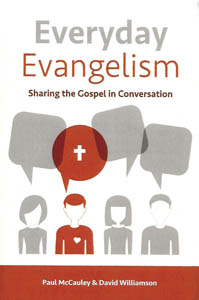
Paperback, 336 pages. Published by John Ritchie Ltd, 40 Beansburn, Kilmarnock, Scotland KR3 1RL. ISBN: 978-1-912522-45-3
Books on the subjects of effective evangelism and Christian apologetics are not in short supply. Many of these emanate from the United States and have gained acceptance to a greater or lesser degree among those desiring to engage in reaching out to their community with the gospel. This book, by two evangelists from Northern Ireland, is based on their own practical experience in meeting and communicating with people from all walks of life, and challenging the present-day rising tide of atheism, apathy and animosity in an increasingly secular society.
The first part of the book is written by David Williamson under the general heading ‘Tactics’. First, he considers the whole purpose of evangelism, then he evaluates the subject under a number of headings from ‘Making Conversation’, to ‘Preaching Christ’. Using illustrations from his own encounters with individuals, David outlines appropriate answers to a variety of situations. At one stage I was afraid that too much emphasis would be placed on formulated responses to anticipated questions, and the suggestion of different types of questions recalled memories of sales seminars and role-play situations. I found that replies learned by rote seldom equated to the question asked. However, the main content is positive and practical. The advice and guidance found in this book could be used to advantage by all believers in communicating the gospel.
The second part of the book under the heading ‘Apologetics’ is written by Paul McCauley. In this section, the writer faces up to the negative attitude experienced by many who would seek to engage with unbelievers in the fundamental truth of scripture. Paul deals with five main subjects which attract sceptical responses when introduced into a conversation. These are scripture, science, suffering, salvation and the Saviour. Each in turn is dealt with in the clear light of scripture and with the benefit of first-hand experience.
One other point I would make is in respect of footnotes. These are obviously essential and welcomed in recording scripture references and the accreditation of written sources. However, there are quite a lot of occasions where comprehensive explanations are given in respect of statements made. Many of these would have fitted quite comfortably and advantageously into the body of the text, rather than to be relegated to a smaller and fainter font which diverts the reader’s eye from following the argument of the narrative.
| Cookie | Duration | Description |
|---|---|---|
| cookielawinfo-checkbox-advertisement | 1 year | Set by the GDPR Cookie Consent plugin, this cookie is used to record the user consent for the cookies in the "Advertisement" category . |
| cookielawinfo-checkbox-analytics | 11 months | This cookie is set by GDPR Cookie Consent plugin. The cookie is used to store the user consent for the cookies in the category "Analytics". |
| cookielawinfo-checkbox-functional | 11 months | The cookie is set by GDPR cookie consent to record the user consent for the cookies in the category "Functional". |
| cookielawinfo-checkbox-necessary | 11 months | This cookie is set by GDPR Cookie Consent plugin. The cookies is used to store the user consent for the cookies in the category "Necessary". |
| cookielawinfo-checkbox-others | 11 months | This cookie is set by GDPR Cookie Consent plugin. The cookie is used to store the user consent for the cookies in the category "Other. |
| cookielawinfo-checkbox-performance | 11 months | This cookie is set by GDPR Cookie Consent plugin. The cookie is used to store the user consent for the cookies in the category "Performance". |
| elementor | never | This cookie is used by the website's WordPress theme. It allows the website owner to implement or change the website's content in real-time. |
| viewed_cookie_policy | 11 months | The cookie is set by the GDPR Cookie Consent plugin and is used to store whether or not user has consented to the use of cookies. It does not store any personal data. |